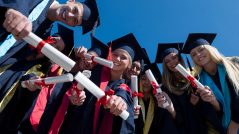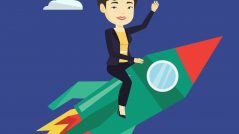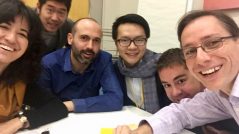Welcome to MBA Voices
Ben went about his life like many of us would normally do. After finishing his schooling, he enrolled himself to a bachelors degree in Mechanical Engineering from Columbia University, New York. After graduating in 2005, he started to work in Honolulu, Hawaii where he indulged in Triathlon as a hobby.
But, his remarkable career sprung to life from there as he started to turn his hobby into a professional athletic career. He quit his job and focused on professional triathlon. Ben was a United States Triathlon National Team Member for 3 consecutive years (2010 to 2012) and has over 30 professional podium finishes.
Currently, he is an Elected Board Member of USA Triathlon. His uniqueness comes from the convergence of his Engineering background, Professional Triathlete accomplishments, a world class MBA from Chicago Booth School of Business and a keen interest in the business world.
Read his inspirational story below (covered in 2 parts).
Benjamin Collins – A Professional Athlete’s Quest for MBA (Part 1/2)
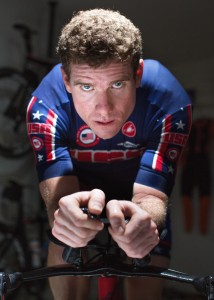
Name: Benjamin Collins
Nationality: American
Business School: The University of Chicago – Booth School of Business
Year of Graduation: 2015
Career Specialization: Strategic Management, Entrepreneurship and Econometrics
Love: Seeing people finish something they didn’t think possible
Hate: overuse of acronyms
Interesting Works: Ben’s blog, sport updates and other interesting information can be found on www.bencollins.org
Ben, run us through your childhood and college days
I grew up in Seattle. My parents were small business owners and gave me a lot of freedom growing up, meaning I was free to explore the city. Seattle is a hilly city and our house was situated in one of the steepest hills which had a slope of 25 degrees. My way around it was mostly on bicycle. This way of growing up helped me to transition to triathlon in an easy way as biking wasn’t hard for me.
You did your bachelors in mechanical engineering and then went on to work in Hawaii. So how did you venture into triathlon?
I pursued my bachelors in Mechanical engineering from Columbia University. Fell in love with robotics, machine learning, and control systems, so when I graduated, I was looking for something of a combination of my interest in swimming and robotics. I joined the academic startup MASE where I worked closely with the University of Hawaii and designed underwater autonomous vehicles.
Hawaii is a magical place. I picked up triathlon as a hobby. But soon I found I was good at it. It revived my childhood dream of being part of the Olympic team.
We usually hear that professional athletes start as early as their childhood. But, in your case you did not venture into professional triathlon until you were 22. This is an incredible progress. How did you achieve this?
This is generally true. But, in the case of triathlon, at least when I started 10 years ago, the athletes start to train and compete professionally at different ages. In United States, a lot of them pursue a single sport in order to get NCAA scholarship, and then move into triathlon the way I did. So, for my generation of US triathletes it was not unusual to start at 22.
You started to do triathlon as a hobby and then became a professional athlete. While it seems a fairy tale, what did you have to do to move it from a hobby to a professional level?
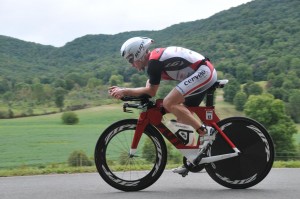
Cycling picture from Chattanooga Ironman Competition a few weeks ago
For me, partly it is a fairy tale. I got to spend 10 years of my life racing around the world in 20 countries and meeting incredible people. Many try and a few succeed – I was happy that I could develop myself into a professional athlete.
I had to give up a lot of things that I liked – The first step was to sell my car to pay for racing and equipment. Second, I had to resign my job and move out of Hawaii, a place I loved, and third, I had to stay with my parents. My parents were willing to allow me to stay with them – in exchange I had to enroll in a graduate degree. In my first year of racing, I actually completed all the preparatory activities to get into a medical school.
Initially, I wasn’t making any money out of racing and hence wanted to have a steady source of income so that I could train for Olympics. It forced me to generate funding for myself and I got sponsorships and found ways to benefit my sponsors through social media, public speaking and consumer research.
Tell us about your early challenges in becoming a professional triathlete
I spent 3 years with limited resources, no social life, totally committed to training and taking classes.
I didn’t see a lot of friends. I was in the swimming pool at 5 am, attended classes from 8 am and again trained the afternoon. I could not afford many necessary things such as coach, physiotherapy and massage which makes it easy to train hard. Some of my time was spent with ice bags trying to recover from the strain of intense training.
The hardest part was to be optimistic about what I wanted to achieve as any objective analysis from friends, family or 3rd parties into what I was and what I wanted to achieve would have indicated that it was not a good idea to pursue an Olympic dream. I could not waste time, had to believe in myself and know that there will be odds but I am going to make it happen.
My bones weren’t ready for the intense professional training at the beginning. So I had injury after injury. It made me think why I am doing this and do I love this enough. After my body adapted to my training rigors the next thing I encountered was the level of competition in the sport, especially when going from the amateur to the professional level.
There was big leap in the competitive level and it made me think hard about whether this is for me, and if I am would be able to compete successfully. In my first professional competition in Poland I finished 40thout of 100 participants. This level of performance was never going to put me on a national team.
I had to hire the best coach and it was hard as I had limited resources. I had to invest in resources that the other competitors had like physiotherapist, massage etc. I had to go and participate in races and events where the officials who choose for the national team were present.
I finished 6th place in a world cup and was qualified for the national team in 2009 and I started in 2010.
You were on the US National Triathlon Team from 2010 to 2012. Tell us a bit about your experiences during that time
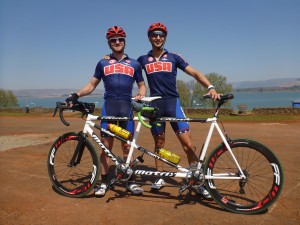
Benjamin Collins with Aaron Scheidies in South Africa para-cycling world cup Sept 2015 – Won 2nd place
Once I was in the national team life got so much easier. They support you with all possible resources and you do not have an excuse in terms of lack of resources or support. You will either succeed or fail but it will have nothing to do with the lack of resources / support. I trained at the Olympic training center.
In the national team it is a bit different. Every activity is focused on maximizing the team performance and results. It is team centered as the country ranking is very important.
The way we earn spots for the Olympics and the number of people we get to send is based on how we are ranked as a country. You get those points by winning world cups and championships. So the funding is conditional on doing those races. I loved these races as you compete with the best in the world. I have been to 20 countries including Australia, Spain and Japan etc.
While you want your team to succeed, you also have to push yourself to succeed for the team and have to do your best. Competition and support are intertwined and you need to learn to deal with these complex dynamics. Sometimes, it happens that some of the team mates to whom you are connected and attached do end up in Olympics even though you don’t. This gives a satisfaction to me and I think we need the maturity to take this positively and be supportive.
Despite not being an Olympian myself, I feel part of that integral process. This is an incredible experience. At times you can be lonely at the top on the podium or see some of your friends in the podium and feel great that they are there. Apart from this there is something special about seeing a country by running, cycling and swimming through it. Often, when visiting countries I like to get lost, travel around like a local, eat, shop etc.
As a professional triathlete you have accomplished many things. What are your top achievements?
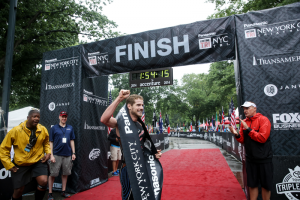
Benjamin Collins Celebrating New York Triathlon Victory
I see achievements as not just medal winning events but as accomplishments in areas that matter to me and are not only limited to what I do, but also the things I can do to help others. My goal in sports – how can I reach my potential and how far can I push myself. I won the New York City triathlon 3 times and have over 30 professional podium finishes.
But, the one that is morally rewarding for me is – I race with Aaron Scheidies who is a visually impaired world champion triathlete. As a guide I raced with Aaron to help him to set the Olympic distance triathlon world record, and to become the first visually impaired athlete to finish this distance in under 2 hours. Now, he is going to the Rio Paralympics in 2016 for cycling and I would be his pilot and teammate, racing a tandem bicycle.
Being part of the national team that participated in the London Olympics in 2012 was an achievement though I didn’t get to represent USA in Olympics.
I am on the board of directors of USA triathlon and this helps me to contribute to the strategic direction of the sport. USA triathlon is the governing body for USA triathletes. We promote the sport and support athletes in order to earn medals for the United States. It is really important for me to give back to the sport that has given me so much.
On a personal level, while pursuing my MBA from Chicago Booth (2013 to 2015) I thought my professional athletic career would suffer as there were not much resources in Chicago to support my athletic career. But, I have gotten better every single year. We have classes and busy schedule, but I have learnt how to balance that with my athletic career.
During your professional triathlete career you spearheaded athlete marketing strategy for K-Swiss. Tell us about it and the benefits it brought to the company
I was the second triathlete K-Swiss took on, along with Chris Lieto who has won several top races. He was also my mentor and helped me to be recruited for the K-Swiss team. They showed me their office and explained about the shoe industry. That was my first experience of being with people who develop shoes for athletes and I immensely enjoyed it.
I also got feedback from other athletes about K-Swiss shoes. The triathlon and running market is big. K-Swiss entered the running market via the triathlon market where the athletes are willing to accept new products or innovative ideas. I added a lot of value to K-Swiss. I did Q&A sessions in triathlon groups, consumer research, gave product feedback, talked to athletes and engaged through social media.
Since I was an athlete, had a technical degree and understood both sides of the market it helped me to add value.
Currently you are an Elected Board Member for USA Triathlon. What activities do you support through this role?
USA Triathlon runs a national team and they also sanction amateur races and report to the US Olympic Committee and International Triathlon Union. I was elected in fall 2014 to the board and I started serving in January 2015.
I wanted to join the board for a few reasons. The selection of triathletes for the Olympics is different compared to other sports because every race and course is different. It is critical to ensure that transparent and simple criteria are deployed for selecting athletes. I wanted to be part of the process of selecting triathletes for Olympics and have helped draft that article and criteria.
On a general note, the sport has given me a lot and I see the various effects it has on people such as losing weight, choosing an active lifestyle, overcoming depression etc. The triathlon community is social, happy, outgoing, supportive and helpful people.
Strategically I wanted to be part of this federation that promotes active and healthy lifestyle. Also, I want to make this a welcoming sport and make it as good as we can. It is a lifelong sport and teaches you to be active in a number of ways.
To access Part 2/2 – Click Here

Globalmbacareer



Latest posts by Globalmbacareer (see all)
- Stuart Barr – Harmonizing Music & Business (Part 2/2) - 30th March 2017
- Stuart Barr – Harmonizing Music & Business (Part 1/2) - 28th March 2017
- Brad Jaeger – Blazes through Racing Circuit & MBA - 25th May 2016
